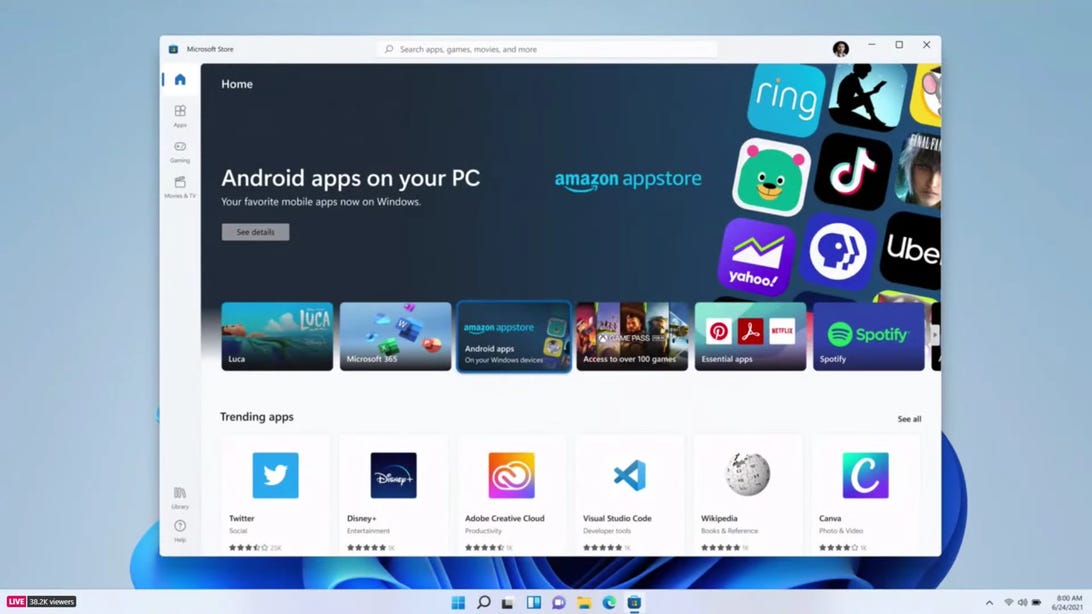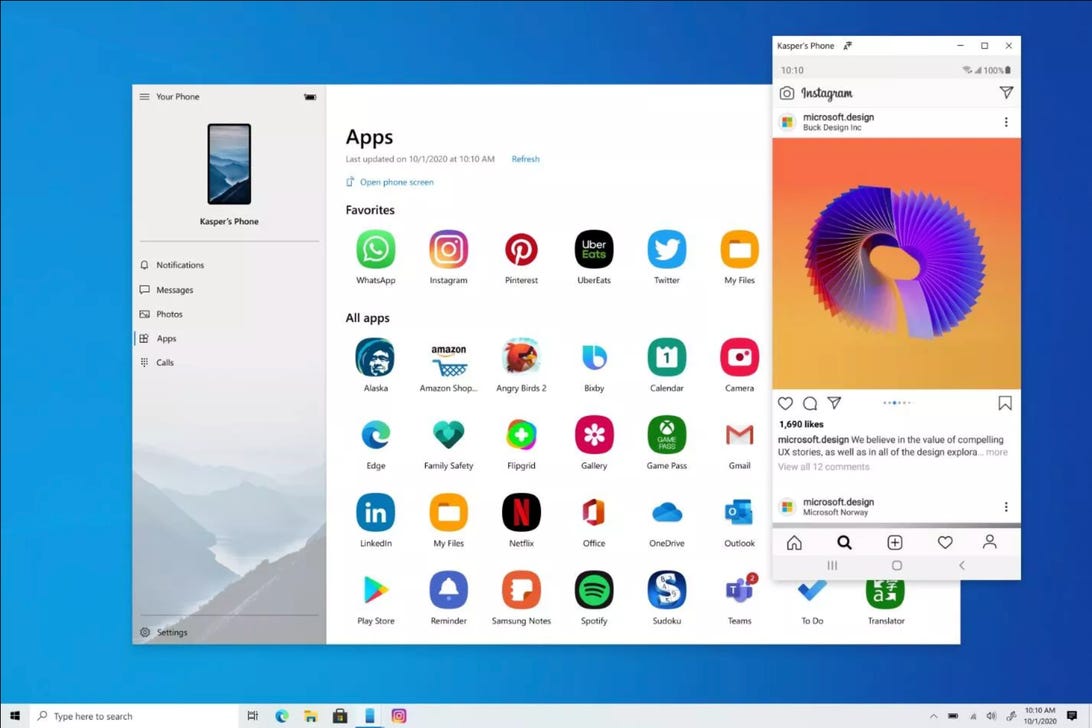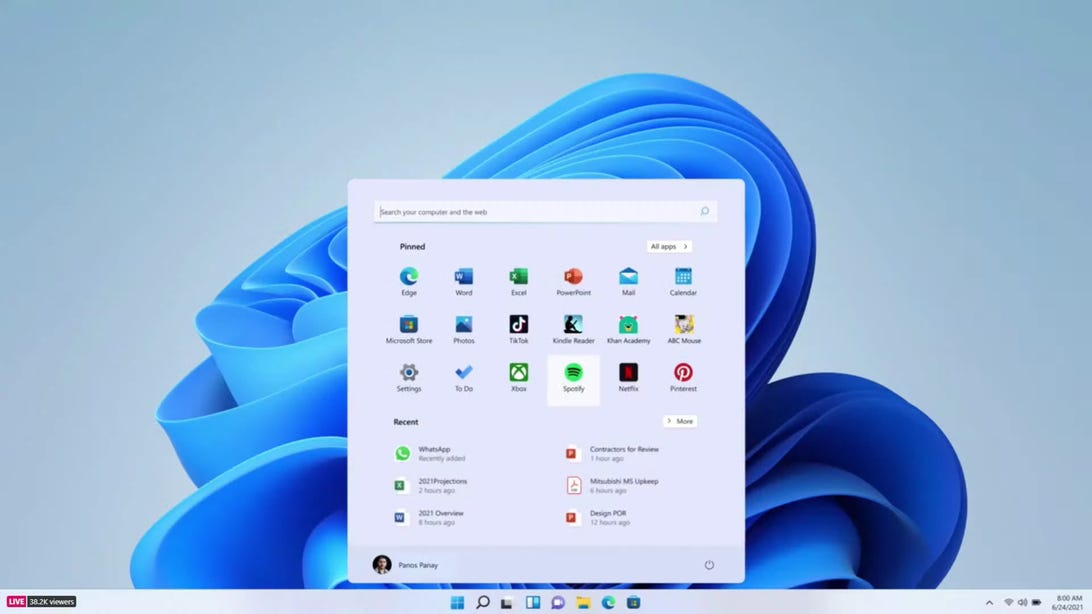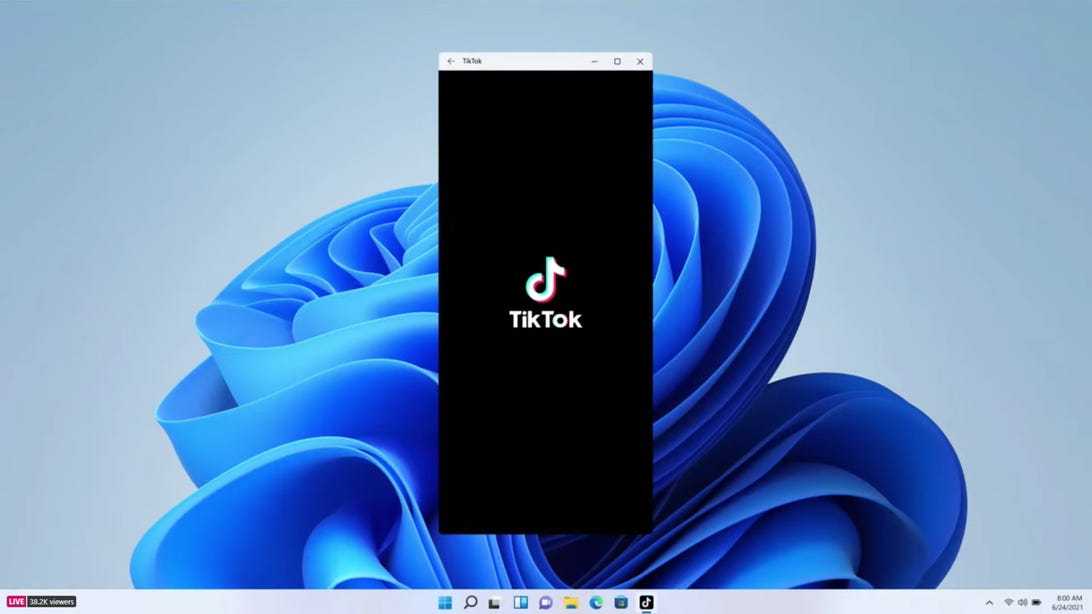
Android apps come to Windows 11? Yep.
Screenshot by Sarah Tew/CNETIt's true: Android apps are finally coming to Windows. They'll be fully integrated into the next version of the OS, Windows 11. You'll be able to discover and search for apps in a new Microsoft Store. And the apps will live right alongside your Windows apps in your Start menu or integrated into the new taskbar.
The announcement, made by Chief Product Officer at Microsoft Panos Panay, capped off Microsoft's virtual event on Thursday for Windows 11. Android apps are something that's seemingly been in the works forever but is actually going to happen when the updated OS is released later this year. And the best news is, it sounds like you might not need anything other than Windows 11 to get them working.
A long time coming
It seems like people have been trying to get Android apps running on Windows PCs for a decade. (Oh wait, it has been a decade.) Microsoft has long had trouble attracting app developers to Windows despite developing tools for Android and iOS devs to port their apps to Windows.
However, in the past few years, Microsoft changed its strategy by making moves to bring your phone experiences to your PC. The company's Your Phone app, for instance, lets you pair your Android device with a Windows 10 PC so you can send and read texts, make and receive calls, see your photos and get notifications.
Also read: Psyched for Android apps on Windows 11? Here's how you can already use some now
Toward the end of last year, Microsoft started rolling out an update to Your Phone that allows you to run Android apps from your phone on your Windows 10 computer. The feature developed from a relationship with Samsung and, consequently, it only works with Samsung devices currently.

Microsoft's Your Phone app.
MicrosoftSamsung also worked closely with Microsoft and Intel for its latest Galaxy Book Pro laptops to give them the responsiveness of a phone as well as access to your Galaxy phone's features and apps. The apps still run inside of another window and not directly on the PC.
Intel helped make it happen
Windows 11, however, won't be dependent on an Android device being synced with your PC. Instead, the apps will run natively on them using Intel's Bridge technology, "a runtime post-compiler that enables applications to run natively on x86-based devices, including running those applications on Windows," Intel said in its related Windows 11 announcement.
Basically, instead of Microsoft trying to get Android developers to convert their apps for Windows as it had in the past, Microsoft teamed up with Intel to just make them work in Windows 11 -- no code changes necessary. AMD and Arm chips won't need Bridge to run Android apps, either.

Android apps will live in the Start menu with Windows apps.
Amazon is part of the package
While Intel is helping make it possible to run Android apps on Windows 11, it's Amazon -- not Google -- that will deliver the apps to users. Amazon's Appstore will be integrated into the updated Microsoft Store and could boost both companies in the process.
Like Microsoft, Amazon has struggled to get developers to deliver Android apps for its Appstore. Amazon's Fire tablets run on a modified version of Android and anyone who's owned one can tell you there are many holes in what's available. People end up installing Google's Play Store because of it.
The Microsoft Store can be similarly infuriating to use -- from its selection to navigation to payment. With the redesign, Microsoft promises to make it easier for developers to get their apps in the store and make more money doing it. Likewise, Amazon is using the new access to hundreds of millions of Windows customers to attract developers and expand their reach by getting in the Appstore. There will be an integrated search, browse and discovery for apps in the updated Microsoft Store.
It's not clear if you'll be able to sideload Android apps from other sources or install Google Play Services and the Play Store separately like the Fire tablets. Amazon was the first to get involved but Microsoft says it's not exclusive. We might find out in the coming weeks. A public beta arrives in July, too.
Google not being directly involved here isn't exactly a surprise, either. After all, Google's competing Chrome OS already has access to Android apps through the Google Play store. The thing is, despite being an option for years now, not all Android apps work on Chromebooks. Hopefully, Microsoft can avoid that with how apps will work on PCs.

Tik Tok on your PC.
Why do I want Android apps in Windows?
A big focus for Windows 11 (and Windows 10, too, really) is this move toward an OS and devices that perform the same regardless of how you use them. Your laptop experience should feel like and be as responsive as your phone. Along with that, you should be able to do the same things regardless of the device.
Opening up Windows to Android apps means a greater selection of tools for productivity and content creation as well as entertainment and gaming. If you want to easily play your favorite mobile games on your laptop or desktop, that will be possible now. There are also services that have a better mobile app experience than using on the web.
The addition of apps means Windows is adapting more to your needs than you having to adapt to what the OS can do. The addition of Android apps to Chrome OS gave Chromebooks a significant boost in appeal. Adding that same flexibility to Windows should have a similar effect.
Article From & Read More ( Android apps and Windows 11: Here's what you should know - CNET )https://ift.tt/2U3L9du
Bagikan Berita Ini














0 Response to "Android apps and Windows 11: Here's what you should know - CNET"
Post a Comment